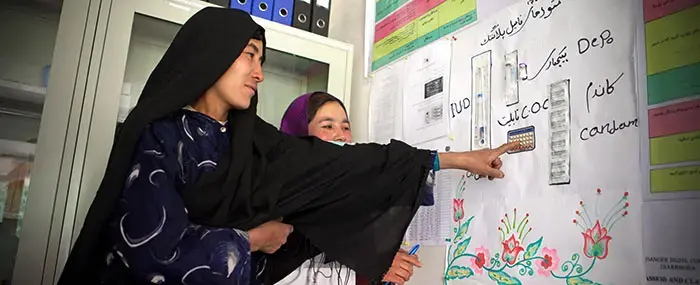In 2003, only a tenth of Afghans used modern methods of family planning. Today, in a little over a decade, their use has doubled contributing to a decline in deaths in childbirth. Nevertheless, only about 22 percent of couples are presently using any contraceptive method. This is attributable to a lack of comprehensive information, inadequate counselling skills among health service providers, limited access to contraception and cultural factors.
UNFPA works with the Ministry of Public Health (MoPH) to provide couples and women the knowledge and means to space their children's births, towards the achievement of the Millennium Development Goals to reduce maternal and infant mortality.
Supporting effective strategies for family planning
In Afghanistan, health care is delivered through the Basic Package of Health Services (BPHS) which emphasizes reproductive and maternal health. A weakened health care system, existing cultural practices and dependence on foreign aid meant that there was a need for a clear, focused strategy to address Afghanistan's specific challenges in improving reproductive health.
To this end, UNFPA supported the MOPH in developing a National Reproductive Health Strategy in 2006, which was instrumental in facilitating a coordinated approach resulting in a decline in maternal mortality and an increase in contraceptive use. Building on this success, UNFPA has since supported the MoPH in updating the strategy, particularly its Safe Motherhood Initiative and Family Planning.
In 2012, the MoPH launched the updated National Reproductive Health Policy 2012-2016 and the National Reproductive Health Strategy 2012-2016 which will guide actions and spending on reproductive health in years to come. In accordance with international conventions, UNFPA has supported the inclusion of women's health issues, including fistula and cervical cancer, increasing contraceptive choice and male involvement, and reproductive health in emergencies. UNFPA subsequently helped translate the strategy into a budgeted action plan to guide work and mobilize resources for reproductive health.
Engaging religious leaders, media and civil society in advocating for family planning
Religious leaders are key to spreading awareness and acceptance of family planning in Afghanistan, where there is a common misconception that contraception is against Islamic principles. Through religious conferences, publications and direct advocacy, UNFPA works with key religious leaders, building on their statements of support for family planning .
UNFPA has organized three family planning and Islam conferences, which were attended by 580 influential religious leaders and community gate-keepers.
Considering the role of media and women civil society in Afghan society, UNFPA in coordination with MOPH trained 120 women civil society leaders and 20 journalists on family planning and birth spacing
Ensuring reliable contraceptive supplies
Awareness must be supported with the means of contraception. This includes ensuring a reliable supply of contraceptives, trained service providers, and an enabling environment in which there is a strong demand for family planning services.
In response to an MoPH request, UNFPA provides contraceptives to government health facilities which are not otherwise supported by donors.
UNFPA also helped the MoPH to develop stock control mechanisms training 22 provincial reproductive health officers and around 47 pharmacists and stock officers from 20 provinces on software applications to manage family planning commodities.
Training service providers on family planning
To ensure health service providers are able to deliver quality family planning services, UNFPA developed a set of guidelines and training packages at the request of the MoPH. These cover subjects such as male involvement in family planning, postpartum intrauterine contraceptive device, implants, and family planning community health workers. More than 350 health facilities received these trainings to strengthen the quality of their services, ensure adequate family planning supplies and their correct management.
In Afghanistan, women still need permission from their husbands to use family planning, and when men seek advice from male health providers, they are often dissuaded. This is a major constraint in promoting the use of contraceptives. To address this, UNFPA and the MoPH trained more than 793 Health service providers, including 350 male health service providers, on family planning.


